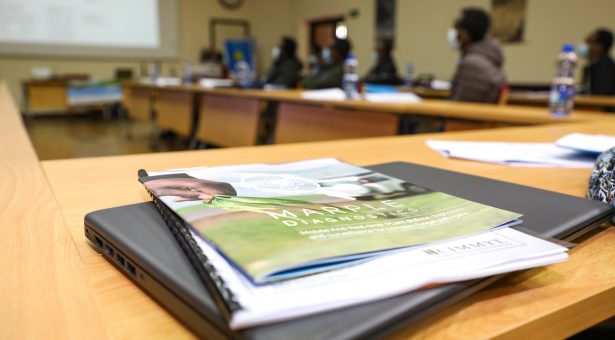Michael makes the most of his PIPS with the MARPLE project

Michael Pointer, a student based at the University of East Anglia, wanted to gain experience of working in a non-HE environment, exposure to communications activities and gain teaching/training experience. Michael followed up an advertisement in the PIPS newsletter and set up an internship with the MARPLE project led by Diane Saunders at JIC in collaboration with CIMMYT and Ethiopian Institute of Agricultural Research (https://www.jic.ac.uk/blog/going-virtual-marple-diagnostics-training-in-the-covid-era/).
The original plan for the PIPS was to undertake the placement in summer 2020 and travel to Ethiopia to deliver a face-to-face workshop to teach researchers from different biotechnology ‘hubs’ in Ethiopia how to use MARPLE technology for in-field wheat rust strain identification. Due to Covid the internship was repeatedly delayed and was ultimately conducted remotely from the U.K.
Michael worked with Diane and another PIPS student to develop an on-line workshop. This involved spending the first month converting and developing experimental protocols into an accompanying course manual, stringent planning and ordering of equipment to be shipped to Ethiopia, and engaging with on-site trainers to enable them to facilitate a workshop on the day, following Michael and colleagues through Zoom. Michael found it quite challenging to develop the workshop remotely and planned a comprehensive risk assessment and contingencies for each part of the workshop.
Michael took the lead on developing the manual using Adobe Indesign, which was a new tool for him. Michael also taught himself how to use Adobe Premier Pro, using Youtube tutorials in order to create accompanying video content for the course. Michael had to liaise with a previous developer of early video content and contacts in Addis Ababa to shoot new video content of the workshop. Michael also wrote a news-style article covering the background, past achievements, virtual training and future aims of the MARPLE project which will be combined with the video and posted on the John Innes Centre (JIC) website. As a side project, Michael started to develop new web-based platform to act as training materials repository using wordpress for wider JIC educational material.
As a result of the placement Michael feels his self-confidence and personal effectiveness have increased and these are things he will take back into his PhD work. Michael’s knowledge, creativity and problem solving also increased as he was working with organisations that were new to him and as such presented very new challenges. “I had to quickly pick up new knowledge and apply it to designing teaching materials for a virtual learning environment that had never been used before by anybody involved in the project”, says Michael.
Organisation was a fundamental part of this PIPS project. The time taken to ship items to Addis Ababa, where the workshop participants were taking part from, meant that a full inventory of materials needed had to be shipped a month in advance, with no time to provide any items that were forgotten. Further, contingency plans had to plan for eventualities that could have interrupted the virtual training (eg, internet/power failure) that are relatively common in Ethiopia, and provide contingencies that would minimise disruption to the training programme.
The MARPLE project is a collaboration between several institutes and therefore team working and communication were key in organising the training workshop. The obvious language barrier provided a further challenge to communication in finding ways to transmit detailed technical information to non-native speakers of English. This was overcome in the training booklet by re-writing the protocols into more simple language, providing visual aids where possible and including detailed information sections and glossaries.
Michael found that the placement confirmed to him the benefits of working within a research institute such as JIC following the end of his PhD. It also made him aware of how transferrable the skills he has developed in his own research project are to other, seemingly unrelated projects and study systems.
Michael has already used his new skills to support his PhD work and has made a video about research being undertaken at NRP which he has promoted on his website and through Instagram & Twitter. If you’d like to listen to a podcast Michael put together about his placement, visit this website.
Michael found his placement to be a very positive and encourages future PIPS students to the greatest extent possible, put your own research aside for the duration of your PIPS – take a break from it and come back fresher. BUT, make good notes before you go!
